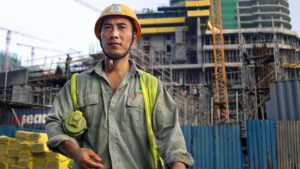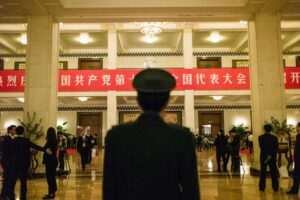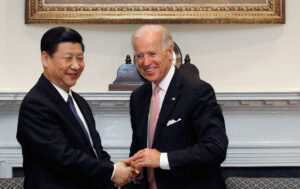Sentosa, a resort island of palm trees and imported sand off the southern coast of Singapore, is a place devoted to pleasure. It has theme parks, golf courses, elegant gardens and casinos. You get the sense that the rules of this famously law-abiding republic might not apply here: a land of the super-rich where villas rent for $35,000 a month.
That sense would turn out to be illusory. In mid-August, Singapore police arrested a couple here in their mid-forties as part of a country-wide raid targeting suspected money-laundering. The man had a passport from Saint Kitts and Nevis, The Straits Times reported, while his partner had a Dominican passport — but both were also Chinese nationals.
Overall, 10 people were arrested across Singapore that day and charged with offences relating to money-laundering. The group held passports from countries including Cyprus, Turkey, and Vanuatu, but all originated from China. Police seized assets including wine, jewellery, Bentley and Rolls-Royce cars and Patek Philippe watches, collectively valued at S$1 billion (nearly £600 million).
The raids and the trials that are expected to follow have shone a light on the exodus of money — both licit and illicit — from Xi Jinping’s China. And it draws attention to Singapore’s role as a haven for China’s business elite, both legitimate businesspeople fleeing an increasingly restrictive regime, as well as the small fraction suspected of financial crime. In 2022, China surpassed Russia as the world’s leading exporter of wealthy citizens, according to Henley & Partners, a firm that advises people on how to get residency and citizenship through investment.
Many business elites have decided that the good life is no longer possible in China as long as Xi continues to torment the private sector. Ever since the disappearance of Alibaba founder Jack Ma in 2020, Xi has been cracking down on the leaders of private businesses. Regulators cancelled the stock exchange listing of Ma’s Ant Group, the giant financial tech business behind the Alipay app, which would have been the biggest stock listing in history. And since then, a number of other sectors have had their collars felt, from online gaming to private tutoring, each move apparently aimed at shoring up the Chinese Communist Party’s vision of a healthy society and curbing the excesses of capitalism.
This February, the banker Bao Fan, a legendary tech dealmaker, went missing. His company China Renaissance said he was “cooperating” in an investigation, the details of which have never been specified though his disappearance has dragged on for months. According to the FT, he was in the process of establishing a family office in Singapore to manage his personal wealth. Such vanishing acts undoubtedly unnerve the super-rich, spurring many of them to flee the country.
That is, if they can find a place to go. Escape routes appear to be narrowing at a time of growing strain between China and the West. Ireland, Portugal and the UK have all abolished “golden visa” programmes that offered residency in exchange for investment. It’s getting harder to leave China too, with immigration lawyers reporting delays in processing passport renewals, while both Chinese and foreign nationals have been banned from exiting. For now, however, Singapore continues to offer a global investor programme which grants permanent residency, a tier just below citizenship. It remains a favoured, and largely discreet, bolthole.
High-profile Chinese residents based in Singapore include Zhang Yiming, the founder of TikTok’s parent company, ByteDance; and Liang Xinjun, a founder of Fosun — and it is rumoured that so do some of the founders of Alibaba. A number of Chinese companies including Shein have also established their global headquarters in Singapore. Nio, a Chinese electric vehicle maker, listed on the Singapore stock exchange last year.
There is little official data that reveals just how many wealthy Chinese have relocated to Singapore, but the indications are everywhere. The cost for expatriates of membership at the 36-hole Sentosa golf club has more than doubled to S$840,000 (nearly £500,000) over the past few years, inflation that appears to be driven largely by Chinese money. There were also about 700 family offices created in Singapore at the end of 2021. These are set up to manage the private wealth of an ultra-rich family, and again the main motor of expansion is the mainland Chinese expat, according to lawyers and other professionals in Singapore.
Mainland Chinese were the biggest foreign buyers of property in Singapore from 2016 until this year, when US buyers overtook them. But while they started out buying largely in Sentosa — the only place in Singapore where foreigners are allowed to purchase landed property — Chinese émigrés are increasingly settling on the main island, renting what Singaporeans call a “GCB”, a “good class bungalow”. This is a sprawling luxury home with its own garden, a status marker on a crowded island where most of the population live in high-rise apartment blocks.
At the start of the pandemic, wealthy Chinese would offer a year’s deposit and a guarantee to pay rent at twice the market rate to secure a property, a Singaporean executive told me. “They’ll spend a few hundred thousand dollars on the interior of the house, including converting one of the rooms into a karaoke bar,” he said. “They’ll buy Bentleys and Rolls Royces — one or two for the husband and wife — and then half a dozen large Toyota vans for their entourage.”
Now, Singapore is turning against these extravagant Chinese émigrés. The city-state balances delicately between East and West: it has deep defence ties with the US — and has allowed America to deploy the Global Hawk, a high-altitude surveillance drone, from its Changi air base this year. Yet it also relies on China as its biggest trading partner. The official reaction to the influx of Chinese money was therefore to be stealthy about it: officials advised Singapore banks not to talk about poaching business from Hong Kong, for fear it would make the Chinese government bristle.
But as the cost of living went up in Singapore, as elsewhere, there’s been growing public discomfort at rising rents and ostentatious displays of wealth by mainland Chinese. Singapore is a tightly disciplined society, with public protest largely restricted to a single city centre park. But it is a democracy all the same and its government is still sensitive to public opinion, particularly after a 2011 general election when concerns about blue-collar immigration and its impact on housing and transport led to gains for opposition parties.
With public opinion souring, Singapore’s regulators are getting tougher on foreign money. Authorities have asked at least 10 banks including Citigroup’s Singapore subsidiary to provide documents to the money-laundering investigation (the bank says it is “committed to the fight against money laundering”). Banks are, in turn, stepping up scrutiny of customers. Singapore government officials are also expected to demand that investors bring productive capital — helping to grow businesses and employ significant numbers in their country rather than just looking for a place to store their wealth.
For an earlier wave of wealthy mainland Chinese in Singapore, it was enough to stay on Sentosa and enjoy their wealth in the relative seclusion of an island that most Singaporeans only visit for a day trip. They were out of sight, out of mind. But later arrivals, with flashier ways, have attracted a level of attention that risks spoiling the fun for everyone.
Disclaimer
Some of the posts we share are controversial and we do not necessarily agree with them in the whole extend. Sometimes we agree with the content or part of it but we do not agree with the narration or language. Nevertheless we find them somehow interesting, valuable and/or informative or we share them, because we strongly believe in freedom of speech, free press and journalism. We strongly encourage you to have a critical approach to all the content, do your own research and analysis to build your own opinion.
We would be glad to have your feedback.
Source: UnHerd Read the original article here: https://unherd.com/




